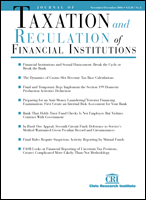Implied False Certification Liability Under the False Claims Act After Escobar
Author: Jason W. McElroy.; Michael Y. Kieval.; Michael S. Trabon.; Joseph M. Katz.
Source: Volume 30, Number 01, Fall 2016 , pp.51-59(9)

< previous article |next article > |return to table of contents
Abstract:
The U.S. Supreme Court recently released the highly anticipated Escobar ruling on False Claims Act (FCA) liability. The Court, by unanimous decision, ruled that “implied false certification” can be a basis for liability under the FCA. Adopting the D.C. Circuit’s standard for assigning liability premised on an impliedly false certification, the Court set forth heightened materiality and scienter requirements, which have already begun to be implemented at the pleading stage by courts throughout the country. This opinion is set to be highly influential on FCA jurisprudence, and should have a particular effect on financial services providers participating in government-backed loan insurance programs. This article analyzes the Supreme Court’s ruling, as well as the weight of authority interpreting it, and also addresses its potential impact on the increased use by government prosecutors of statistical sampling to plead and prove such cases.Keywords: false claim; implied certification; materiality; scienter; statistical sampling; Universal Health Services. v. United States ex rel. Escobar
Affiliations:
1: Weiner Brodsky Kider PC; 2: Weiner Brodsky Kider PC; 3: Weiner Brodsky Kider PC; 4: Weiner Brodsky Kider PC.